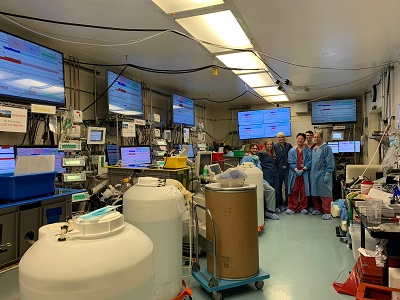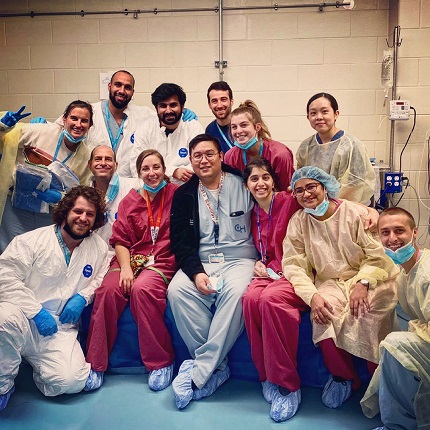STS News, Fall 2021 — The Society’s charitable arm, the Thoracic Surgery Foundation (TSF), powers learning, innovation, and research in cardiothoracic surgery, often filling niches in underrepresented communities.
For women entering a career in cardiothoracic surgery, the Nina Starr Braunwald Research Award offers a prestigious opportunity to bring original research to the table. Mallory Hunt, MD, MBE, an integrated cardiac surgery resident at the University of Pennsylvania in Philadelphia, used her award to explore complications associated with congenital heart disease before patients leave the womb.
“Children who have congenital heart disease are living longer because we’re getting better at operating on them,” said Dr. Hunt. “Now we’re observing that they have neurological and neurodevelopmental sequelae later in life, meaning that they tend to lag behind their peers in areas such as educational achievement, employability, and functional status.”

Dr. Hunt's lab training gave her and her team unique access to a simulated womb model.
For years, the medical community speculated that these sequelae were a consequence of surgical interventions in the first few days of life, Dr. Hunt explained. But now there’s evidence that complications may begin as early as the fetal stages. By studying the effects of placental insufficiency and in utero hypoxia, Dr. Hunt’s team sought to better understand the conditions that may lead to heart defects and developmental complications.
Obviously, recreating these conditions would be problematic in human fetuses. But while Dr. Hunt was studying under J. William Gaynor, MD, at Children’s Hospital of Pennsylvania in Philadelphia, she was introduced to a model akin to an artificial womb. Developed originally as a means of supporting babies who were born extremely premature, this womb model provided Dr. Hunt’s team with a tool to simulate in utero oxygen delivery in developing sheep.
“We were able to deliver fetal sheep at what would roughly be sort of a second-trimester gestation equivalent to that of a human,” Dr. Hunt said. “We placed a group of sheep in this womb environment in conditions that were relatively hypoxic, as well as a group in an environment more representative of that of a normal fetus without congenital heart disease.”
“Children who have congenital heart disease are living longer because we’re getting better at operating on them.”
Initially, the researchers focused especially on observing neurodevelopmental status in the fetuses. “Over time, though, the project really evolved and took on a life of its own, because we realized that we were able to study basically every organ system within the body,” said Dr. Hunt. “Through collaborations with researchers in different schools at the university, we now have people who are looking at all major organ systems, and I think that’ll tell us a lot—not just about average developmental habits in children who have congenital heart defects, but also how development is altered in children who are hypoxic in utero for other reasons.”

Prior to this project, Dr. Hunt’s research had been mainly clinical in nature, focusing on outcomes for children who had undergone heart surgery for congenital defects. “But not necessarily anything that involved bench research or translational research,” she said. “At a certain point I was thinking about what I wanted my career to involve from the research arm, and I realized that there was this great opportunity to pursue projects that addressed the problems we saw in the clinic from a more basic science point of view. And then see those projects from inception to hopefully implementation into clinical practice.”
Dr. Hunt says that the financial support of the Braunwald award was critical to bringing her project to life. “Women are underrepresented in our field, and dedicated research awards targeted at female trainees is such a great opportunity for us. It helps us establish ourselves in a way that’s unique and that highlights what we’re able to do. It really has helped propel my career over the last few years, not just in terms of funding but also in terms of the connections I’ve been able to make with people interested in my research.”
TSF Surgeon Match Challenge Doubles the Impact
There’s no better time to make a TSF donation and help fuel projects like Dr. Hunt’s. In July, TSF and STS launched the Surgeon Match Challenge, pledging to match surgeon donations up to $100,000.
This year, Eugene Braunwald, MD, husband of the late Nina Starr Brunwald, MD, for whom the award is named, pledged $1 million to support the Braunwald Fund—if TSF can raise $500,000 in matching funds.
Surgeon donations will be distributed to the fund designated by the donor, and corresponding match dollars will be directed solely toward TSF’s “area of greatest need,” a fund primarily used to award research grants.
Nina Starr Braunwald was the first woman to be certified by the American Board of Thoracic Surgery, and in 1960, she led the team at the National Institutes of Health that performed the first successful artificial mitral human heart valve replacement—with a valve that she herself designed and fabricated. The TSF research award in her name provides up to $50,000 per year for up to 2 years to support original research efforts by early career women cardiac surgeons.
In 2020, TSF awarded $1,056,600 in grants for 36 recipients. To support research, education, leadership, and surgical outreach programs for cardiothoracic surgery, give today at thoracicsurgeryfoundation.org/donate.